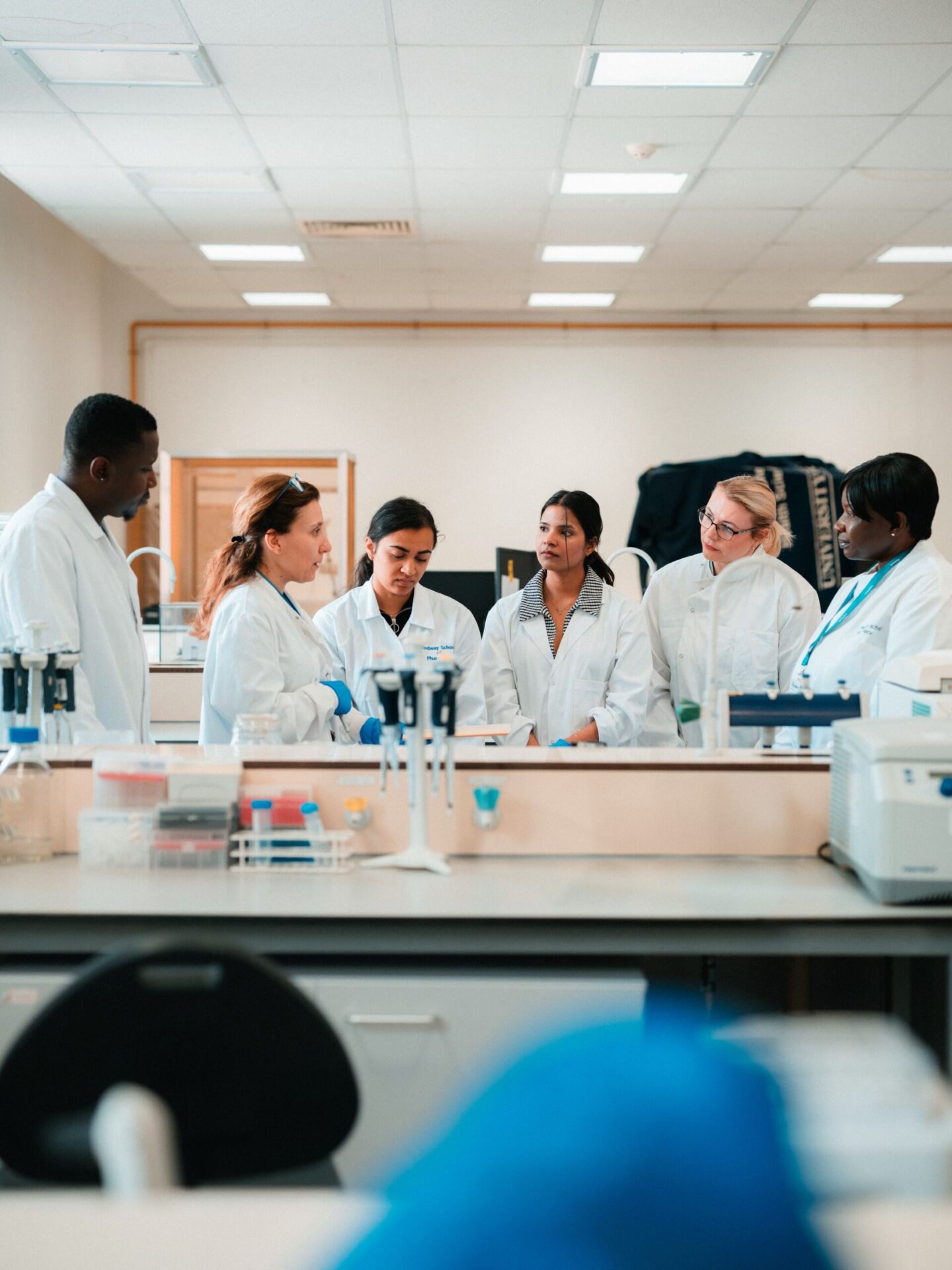Overview
Become the point of contact for patients for the safe and effective use of medicines. Our four-year Pharmacy programme prepares you for a successful career as a pharmacist in community or hospital settings.
Hosted at the Medway School of Pharmacy, our accredited programme is based on three interlinked themes: the science of medicines, professional practice and prescribing, and biomedical science and therapeutics. Our curriculum is outcomes-focused and designed to prepare you for your future professional practice. You study basic and applied science as well as clinical and professional practice, all in the context of patient care. You will also undertake external placements throughout your course, so that by the time you graduate you have the skills and the confidence to kickstart your career.
Course structure
The following modules are indicative of those offered on this programme. This listing is based on the current curriculum and may change year to year in response to new curriculum developments and innovation.
You are required to study the following compulsory modules:
Stage 1 compulsory modules
- Biomedical Science & Therapeutics 1
- Patient Safety & Quality Competencies 1
- Professional Practice & Prescribing 1
- The Science of Medicines 1
Stage 2 compulsory modules
- Biomedical Science & Therapeutics 2
- Patient Safety & Quality Competencies 2
- Professional Practice & Prescribing 2
- The Science of Medicines 2
Stage 3 compulsory modules
- Biomedical Science & Therapeutics 3
- Patient Safety & Quality Competencies 3
- Professional Practice & Prescribing 3
- The Science of Medicines 3
Stage 4 compulsory modules
- Patient Safety & Quality Competencies 4
- Quality Use of Medicines
- Research Project
- Prescribing Scope of Practice
Please contact the Medway School of Pharmacy for information about the course structure.
Teaching & Assessment
The MPharm programme is centred around three main themes; the medicine, the patient and the professional. These aspects come together and are integrated through demonstrating patient care around integrated cases. We have a strong focus on developing professional actualisation and working with other health and care professionals as part of a multidisciplinary team working around, and improving the care of, patients and the public. The importance of learning from and about a range of health and care is developed through the programme.
A range of teaching methods will be used from traditional lectures and video recordings, seminars, tutorials, laboratory sessions, practical's, online work, reading, independent study, reflecting on assignment feedback and practice-based learning.
This will be delivered in person, online (using computer aided learning) and via patient-simulation with our standardised patients. This is supported by developing our high fidelity simulations enabling the provision of a realistic and safe environment supporting the development of knowledge and skills.
Application and demonstration of knowledge and skills through teaching and learning is critical to embedding learning. The placement in the workplace further builds on this and contextualises practice whilst also building links with a range of health and care professionals.
Assessment
A range of different assessment types will be utilised, from written examinations, multiple choice question tests, coursework (for example laboratory assessments, professional and therapeutic decision making), oral presentations, poster presentations, clinical simulation activities with standardised patients, patient safety competences (including pharmaceutical calculations, dispensing and portfolio activities) and production of a research paper.
Contact Hours
For a student studying full time, each academic year of the programme will comprise 1200 learning hours which include both direct contact hours and private study hours. The precise breakdown of hours will be subject dependent and will vary according to modules.
Methods of assessment will vary according to subject specialism and individual modules.
Please refer to the individual module details under Course Structure.
Entry requirements
Home/EU students
The University will consider applications from students holding a wide range of qualifications. All applications are assessed on an individual basis but some of our typical requirements are listed below. Students offering qualifications not listed are welcome to contact our Admissions Team for further advice. Please also see our general entry requirements.
| Qualification |
Typical offer/minimum requirement |
| A level |
ABB including Chemistry grade B plus another science subject |
| GCSE |
GCSE Mathematics and GCSE English Language at grade 5/B |
| Access to HE Diploma |
The University will not consider applicants holding Access to HE Diplomas. |
| BTEC Level 3 Extended Diploma (formerly BTEC National Diploma) |
DDD |
| International Baccalaureate |
32 points overall or 15 points at HL including HL Chemistry at 5 and one other HL science-based subject at 5 |
| T level |
Science (Laboratory Sciences) at grade Distinction |
International students
International students
If you are an international student, visit our International Student website for further information about entry requirements for your country, including details of the International Foundation Programmes. Please note that international fee-paying students who require a Student visa cannot undertake a part-time programme due to visa restrictions.
Please note that meeting the typical offer/minimum requirement does not guarantee that you will receive an offer.
English Language Requirements
This course requires a Good level of English language, equivalent to B2 on CEFR.
Details on how to meet this requirement can be found on our English language entry requirements web page.
Examples:
IELTS 6.0 with a minimum of 5.5 in each component
GCSE Grade 4/C or above in English Language
IB Standard Level Grade 5 or above in English A: Language and Literature
A Level Grade C or above in English Language or English Literature.
Careers
Graduate destinations
Our graduates are qualified to work in all branches of the profession such as:
- hospitals
- the NHS
- pharmacies
- primary care
- industry
- the armed services
- prison services
- academia.
Help finding a job
The University has a friendly Careers and Employability Service, which can give you advice on how to:
- apply for jobs
- write a good CV
- perform well in interviews.
Work experience
Throughout the programme, you complete a number of external placements in hospitals and community pharmacies.
In your first year, you spend one week in a community pharmacy. You then spend one week in hospital and one week in a community pharmacy during your second year of study. In Year 3, you go out to a hospital and a community pharmacy for one week each. In your final year of study, there are two weeks of developing your prescribing and scope of practice and in addition we are developing a further two weeks of placement in a community pharmacy, hospital, GP surgery or industry.
Career-enhancing skills
Our graduates develop substantial transferable skills that are valued in a range of work environments.
These skills include:
- communication
- organisational and research skills
- writing reports
- performing laboratory work
- working effectively and considerately in teams.
You can also gain extra skills by signing up for our Kent Extra activities, such as learning a language or volunteering.
Professional recognition
You are required to complete foundation training in practice and pass a registration exam before you can become a registered pharmacist in Great Britain. This is a separate programme for which you need to apply and a place on the programme is not guaranteed.
The programme has Part 1 accreditation from the General Pharmaceutical Council.
Fees
Tuition fees in England for 2026 have not yet been set. As a guide, the 2025 annual fee for Home students is £9,535.
Tuition fees may be increased in the second and subsequent years of your course. Detailed information on possible future increases in tuition fees is contained in the Tuition Fees Increase Policy.
-
Home full-time
£9790
-
EU full-time
£23500
-
International full-time
£23500
For details of when and how to pay fees and charges, please see our Student Finance Guide.
Your fee status
The University will assess your fee status as part of the application process. If you are uncertain about your fee status you may wish to seek advice from UKCISA before applying.
Your fee status
The University will assess your fee status as part of the application process. If you are uncertain about your fee status you may wish to seek advice from UKCISA before applying.
Additional costs
New students are subject to a number of small mandatory costs at the start of their course of around £100 in total.
- Students on the MPharm programme must complete the Disclosure and Barring Service (DBS) check as part of the fitness to practise and admission process. This is currently charged at £53.
- We ask that all students purchase lab coats, safety glasses and a notebook at a cost price of £18.
Find out more about accommodation and living costs, plus general additional costs that you may pay when studying at Kent.
Funding
Kent offers generous financial support schemes to assist eligible undergraduate students during their studies. See our funding page for more details.



